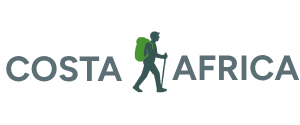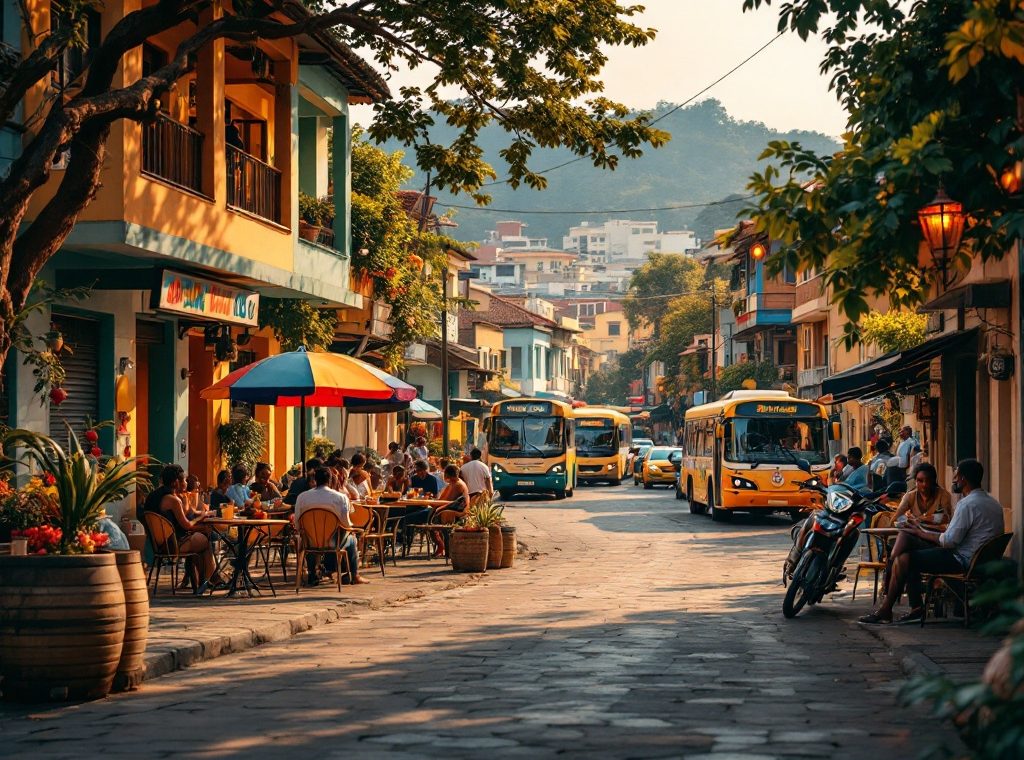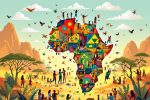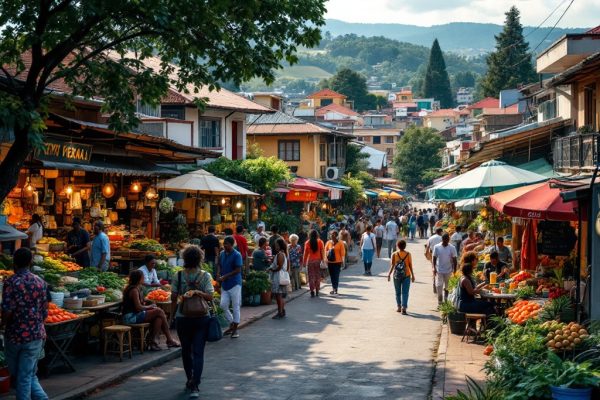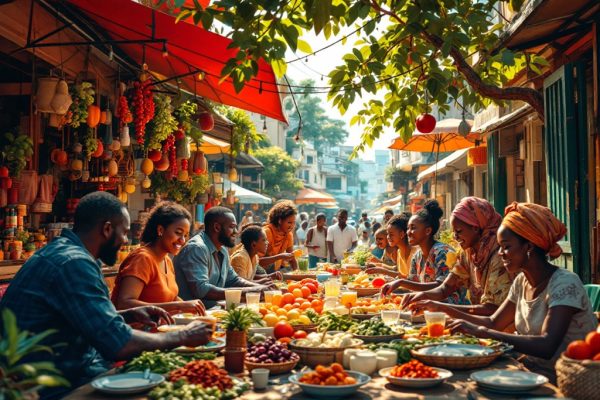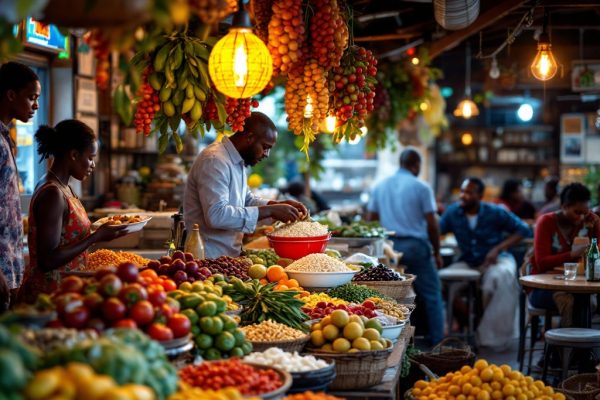Everyday Cost of Living in Ghana
Dreaming of a life in Ghana? Discover the allure of affordable living, where a single person can thrive on roughly $571.6 per month and a family of four on about $2,051.8 (excluding rent). From bustling Accra to serene rural towns, explore diverse housing options, with city-center apartments averaging $502 and charming rural rentals as low as $100. Savor the flavors of Ghana with budget-friendly local cuisine or indulge in international dining. Navigate the vibrant streets with ease using affordable public transport, and enjoy reliable internet access for around $42.60. Uncover essential budgeting tips and learn how currency fluctuations can impact your expenses. Start planning your Ghanaian adventure today!
Important information
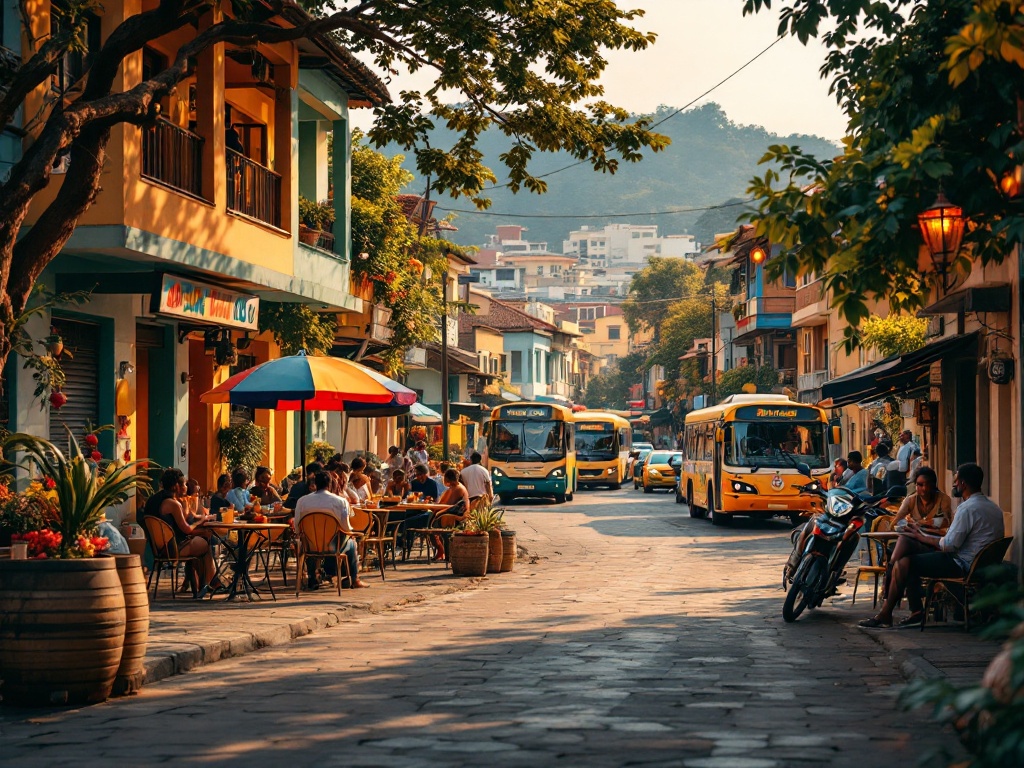
- Excluding rent, a single person’s estimated monthly expenses are around $571.60, while a family of four can expect to spend about $2,051.80.
- Rent for a one-bedroom apartment in Accra’s city center ranges from $300 to $800, but significantly less in rural areas ($100-$300).
- Food costs vary, with groceries costing $100-$300 per month for a single person and $200-$400 for a family of four. Local markets offer the most affordable produce.
- Public transport like tro-tros (minibuses) and taxis are inexpensive, with fares between $0.20 and $2.00. A monthly transport pass costs around $32.
- Utilities (water and electricity) typically cost $100-$200 per month, while internet services range from $25 to $60 monthly.
Estimated Monthly Costs in Ghana
Planning a move to Ghana? A single person’s monthly expenses, excluding rent, are estimated around $571.6. A family of four should budget approximately $2,051.8 per month, also excluding rent. Remember that actual costs will vary depending on lifestyle and location. Living in big cities like Accra tends to be more expensive than in rural towns.
Family of Four
A family of four in Ghana can anticipate spending around $2,051.80 monthly, not including rent. This covers necessities like food, utilities, and transportation, along with other miscellaneous expenses. City center rent, particularly for a one-bedroom apartment, can significantly increase this budget. Living costs also fluctuate based on location and lifestyle.
Single Person
The estimated cost of living in Ghana for a single person is approximately $571.6 per month. This includes essential expenses such as food, utilities, and transportation.
Housing and Rent Costs
Housing costs in Ghana are significantly lower than in the US, with rent averaging 75.8% less.
One-bedroom apartments in Accra’s city center cost between $300 and $600 monthly. Outside the center, similar apartments rent for $150 to $400.
While buying property in prime areas remains expensive, more affordable options exist in rural areas.
One-bedroom rentals are available for $100 to $300 per month in rural areas. This makes Ghana’s housing market an attractive option for those seeking lower costs.
Rent in City Centre
Ghana offers attractively priced city-center apartments, averaging $502 per month for a one-bedroom. This is significantly less expensive than similar accommodations in developed countries. In Accra, the capital, expect slightly higher rates, ranging from $400 to $800 for a centrally located one-bedroom. Venturing outside the city center lowers the cost considerably, with rents between $200 and $500. Even more budget-friendly options are available in smaller Ghanaian cities, where you can find housing for as little as $150 per month.
Food and Dining Expenses
Food costs in Ghana depend on your lifestyle. Groceries typically cost between $100 and $300 per month. Local markets offer inexpensive fresh produce, while imported goods are more expensive. Eating at local restaurants is budget-friendly, with meals costing from $2 to $10. However, upscale dining can cost between $10 and $30 per meal.
Budget-Friendly Options
- local markets for fresh produce,
- meals at local restaurants.
Higher-End Options
- imported goods,
- upscale dining experiences.
Consider your preference for local or international cuisine when budgeting. Buying fresh produce at local markets is a great way to save money.
Groceries
Grocery shopping in Ghana offers a range of options and costs. Individuals can anticipate spending between $100 and $200 monthly on groceries. Common staples such as rice, bread, and vegetables are generally affordable. Imported goods, however, are typically more expensive. For the freshest and most budget-friendly produce, local markets offer considerable savings compared to supermarkets. A family of four can expect a monthly grocery bill ranging from $200 to $400 for essential food needs. Shopping at local markets is a great way for families to maximize their food budget.
Local and International Restaurants
Enjoy delicious and affordable meals at local eateries, averaging just $3.66 per person. For a special occasion, indulge in a three-course meal for two at a mid-range restaurant for approximately $42.77. Explore the diverse international flavors available.
Transportation Costs
Getting around Ghana on public transport is easy on the wallet. Short trips cost between $0.20 and $1.00 for tro-tros (minibuses), and around $1.00 to $2.00 for taxis. Longer journeys are served by public buses. Ride-sharing apps offer a convenient alternative, but typically come at a premium. Expect to spend between $50 and $100 per month, depending on travel frequency and your preferred mode of transport. Car ownership in Ghana incurs additional expenses like fuel (around $1.00 to $1.50 per liter), insurance, and maintenance.
Public Transportation and Trotro
Ghanaians travel by bus or trotro (minibus) for a fare of $0.20 to $2.00 per ride. A monthly pass, costing $32.03, offers a cost-effective alternative for frequent commuters.
Taxi and Car Expenses
With low starting fares of just $1.42 and gas prices hovering around $4.16 per gallon, taxis in Ghana offer an affordable and practical way to travel.
Utilities and Internet Services
Monthly utility expenses:
- Water: $100 to $200.
- Electricity: $100 to $200.
Communication expenses:
- Internet: $25 to $60 (depending on speed).
- Mobile phone: variable, depending on usage.
Affordable options are available for both internet and mobile phone services.
Basic Utilities
Living in a 915 sq ft apartment in Ghana offers affordable utility costs. Basic services including electricity, heating, cooling, water, and garbage collection average around $51.16. This makes Ghana an attractive option for budget-conscious individuals or those seeking a lower cost of living.
Internet and Mobile Phone Plans
Ghanaians can enjoy reliable high-speed internet (60 Mbps or more) for about $42.60, offering excellent value for consistent online access.
Other Living Expenses
Clothing: In Ghana, your clothing budget depends on your preference for locally made or imported items. Local clothes offer significant savings, while imported options are more expensive.
Entertainment: Free activities are plentiful, from exploring local markets to relaxing on Ghana’s beaches. Concerts and nightclubs will be more costly.
Fitness: Gym memberships and fitness classes can be expensive, but outdoor exercise offers a free alternative.
Childcare and Education: International schools are typically more expensive than local schools.
Clothing Costs
In Ghana, clothing costs vary depending on the brand and quality. A single item might be as affordable as $25, while high-end pieces can reach $100.
Entertainment and Leisure Activities
A fantastic evening in Ghana will likely cost around 5,000 cedis. This includes entertainment and leisure activities for a truly memorable night.
Fitness and Health
The average monthly gym membership for an adult costs around $33.
Childcare and Education
Private preschool in Ghana costs parents an average of $77.86 per child monthly.
Ghanaian Lifestyle and Budgeting
Living in Ghana requires careful budgeting due to fluctuating currency values and inflation. Location significantly impacts expenses, with city life in Accra considerably more expensive than rural areas. Major costs include housing, transportation, food, and healthcare. These all influence your budget. A single person’s monthly expenses typically range from $500 to $1,500, while a family of four might spend between $2,000 and $4,000. Effective budgeting is essential for managing these costs and navigating Ghana’s economic landscape.
Everyday Expenses and Budgeting Tips
Managing your finances while traveling in Ghana involves being mindful of your daily expenses and creating a practical budget. Consider using affordable transportation options like trotros. Preparing your meals at home and limiting outings can significantly reduce costs. Bargaining at local markets is another effective way to save money. These small changes can make a big difference in your overall travel budget.
Tips for managing your finances in Ghana
- monitor your daily spending,
- create a realistic budget,
- use cost-effective transport (like trotros),
- cook at home more often,
- reduce the number of outings,
- bargain at markets.
Benefits
- significant cost savings,
- better control of your travel budget,
- more immersive cultural experience (by using local transport and markets).
Impact of Currency Stability and Inflation
An unstable currency erodes your purchasing power as inflation pushes prices upward, diminishing what your money can buy. A volatile currency coupled with high inflation makes budgeting and financial planning extremely difficult.
Conversely, a stable currency with low inflation keeps goods and services affordable. This makes living expenses predictable, simplifying both budgeting and financial planning.
Living Alone in Ghana: Considerations and Tips
Living alone in Ghana requires careful budgeting. Major expenses include accommodation, food, transport, and utilities. In Accra, expect monthly costs between $500 and $1,000. Smaller towns offer more affordable living, ranging from $300 to $600 per month. Housing costs significantly impact your budget.
Accommodation Costs in Accra
A city-center apartment could cost anywhere from $300 to $800 monthly.
Rent outside the city center typically falls between $150 and $400.
Other Expenses to Consider
- Food,
- Transportation,
- Healthcare,
- Potential currency fluctuations.
Rural housing is generally the cheapest option.
Thorough planning is essential for comfortable living in Ghana.
